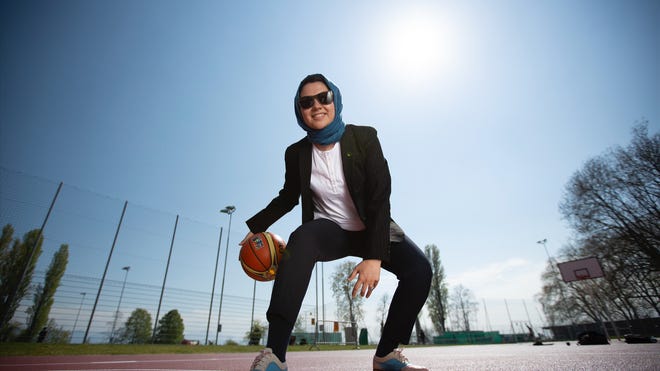I started playing basketball when I was 14 years old in school in Kabul, Afghanistan. The Taliban made me a refugee twice – first to Iran as a child and now abroad for a second time. When my family returned to Afghanistan in 2003, I was the first generation of girls to go back to school and play a variety of sports.
However, women’s basketball, and all sports, are not widely accepted in Afghan society, and as female athletes, we were frequently threatened by extremists. Holding a basketball or wearing sportswear was a radical act for me, so off the court, I wore my Converse All-Star shoes in public to assert that I, and all women and girls, have the right to play sports.
Before the Taliban returned to power in 2021, the number of female athletes in Afghanistan was on the rise. We women had to become human rights defenders, educators, and community leaders, even if only to participate in the arenas and tournaments that other athletes around the world take for granted. Sports became a means to promote our own rights, including the right to health and education. Eventually, millions of Afghan women and girls were able to play sports in school, ride bikes, dream of sports scholarships, compete for their country, and even open gyms or launch sports-related businesses.
Now, Afghan women and girls are being pushed off the courts, tracks and gyms by the Taliban, who took power for a second time in August 2021. In the weeks since the fall of Kabul, the Taliban have reversed two decades of progress on women’s rights: girls are not allowed to attend school beyond the sixth grade, women cannot work, and female athletes have been forced to burn their jerseys, bury their medals, hide their sports equipment or flee the country.
Where are the women?Our eyes are not deceiving us: men are fleeing Afghanistan.
Paris Olympics bring visibility and hope to Afghan female athletes

But as the Paris Olympics open this week, three Afghan women will join three men in leading a procession of countries along the Seine River. The female Olympians had to leave Afghanistan to represent the country at the Paris Olympics.
Since the Taliban came to power, thousands of Afghan athletes, both male and female, have sought refuge abroad where they can continue training and competing, including former Olympic and Paralympic athletes, national athletes in dozens of sports, and members of the Afghanistan women’s football, basketball and cricket national teams.
Athletes competing in the Paris Olympics:USA Women’s Olympic Basketball Team Members
In Paris, our female Olympic athletes will proudly represent our country on the world stage to billions of spectators, despite the Taliban restricting and limiting the rights of all women.
As a former women’s national basketball player, I am proud of all my country’s athletes and honored to represent them as a female member of the International Olympic Committee.
The Olympic Charter outlines principles that guide the IOC’s work, including opposing discrimination on the basis of gender, which is why the IOC recognises and supports Afghan female Olympians, despite the Taliban regime not accepting them.
Afghan sprinter Kimia Yousofi will compete in her third Olympic Games in Paris. She says she represents “the stolen dreams and hopes of Afghan women and girls” – “those who do not have the power to make decisions as free human beings.”
Afghanistan’s female athletes at the Olympics have made progress, but there is still work to be done
Kimia and the other Afghan athletes competing in Paris are the clearest evidence yet that the Taliban have not succeeded in crushing women’s sport, or the female spirit.
The Taliban are desperate for international recognition: no country or UN agency has recognised the legitimacy of their rule because of continued discrimination against women.
The IOC rightly banned anyone with ties to the Taliban from participating in the Paris Games, the most gender-equal games in history.

But this is not the end point for Afghan women and girls. There is an urgent need for pressure on the government, the UN and other key actors to restore the basic human rights of Afghan women.
While we cheer for all the athletes at the 2024 Olympic and Paralympic Games, we must not forget the 20 million Afghan women and girls who are denied their basic rights to education, work, health and access to sport.
Samira Asghari A former captain of the Afghanistan women’s national basketball team, she later served on the Afghanistan Olympic Committee. In 2018, at age 24, she was elected to the International Olympic Committee, becoming Afghanistan’s first representative to the IOC and one of the youngest members in its history.

